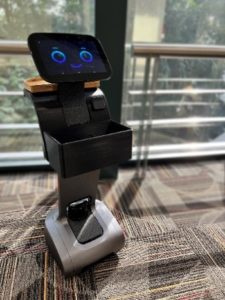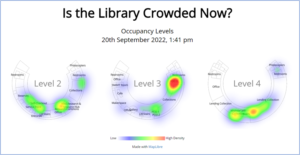Using Automation and AI to Enhance User Experiences at the National Institute of Education Library
23 February 2023
Challenges Arising from the Pandemic
The National Institute of Education (NIE) Library, Singapore provides resources and services to support the teaching, learning and research programmes of the Institute. In order to continue providing excellent library services while keeping staff and users safe amidst the COVID-19 pandemic, our librarians from cross functional teams collaborated to transform NIE library’s service delivery model through technology and innovation.
 Implementation of Temi – NIE Library’s Service Robot
Implementation of Temi – NIE Library’s Service Robot
Following brainstorming sessions, a project team was formed to evaluate, explore and implement Temi, a concierge service robot. With voice interaction and navigation AI technologies, Temi’s features include:
- remote video calls with a librarian,
- being a wayfinding tool,
- giving tours,
- providing information and
- giving friendly alerts.
Click on this video to see Temi in action.
Using Near Real-time Crowd Data to Guide Robot Actions
The library collaborated with our institutional IT unit to obtain non-sensitive near real-time Wi-Fi usage data and use it as a proxy for crowd information. Using Robotic Process Automation (RPA) with UiPath, the data is periodically uploaded to the cloud. The project team extended Temi’s out-of-the-box capabilities by programming Temi to monitor the cloud data and automatically go to crowded areas to perform actions such as friendly reminders for safe distancing and wearing of masks, or marketing of library events. Apart from the initial one-time setup and potential maintenance that may accompany software updates, minimal subsequent staff intervention is required to manage the automation. Beyond using crowd data for targeted message delivery, we look forward to experimenting with this approach on other kinds of data, for different kinds of user engagement – the possibilities are numerous and exciting.
Crowd Map at Users’ Fingertips
By using Geographic Information Systems (GIS) and web programming technologies, the team rendered the crowd data as a mobile-responsive heatmap. The team published the map in our library portal so that users can refer to it conveniently on their mobile devices. This enables our users to assess the crowd situation before deciding on whether to visit the library or which floor to go to.
 Helping Faculty Launch the AI@NIE Blueprint
Helping Faculty Launch the AI@NIE Blueprint
Beyond serving library users, Temi was enlisted to help in the launch of AI@NIE. After seeing Temi in action, the AI@NIE committee found Temi rather apt and capable in being part of the official launch event of AI@NIE on 25 May 2022. Temi was assigned a brief but symbolic task of navigating to Guest of Honour Dr Maliki Osman (Second Minister for Education) and offer the button to trigger the official launch of the initiative. A photo of Temi in the limelight was captured and published in the Straits Times.
Delighting Users in Library Tours
Since the borders reopened, the library received visitors from universities abroad and Temi assists in our library tours, to the amusement of our users. Temi is able to bring tour groups on a pre-set tour sequence and speaks from a script, with the capability of playing music and videos. With this arrangement, aside from engaging users in richer ways, the accompanying librarian can focus on the “human touch” – i.e., higher-order engagement with users, such as answering questions, and is relieved from menial tasks of memorising scripts and tour sequences.
Conclusion
Amidst the COVID-19 situation, the Temi project team embarked on a bold attempt to learn to incorporate AI and data to transform the library’s service delivery model. The team further programmed Temi to monitor near the real-time crowd data to automatically deliver friendly reminders at crowded locations. The crowd data was rendered on a mobile-responsive heatmap to help users plan their trip to the library. The suite of data and AI driven automation initiatives offer richer user experiences, protect the safety of users and staff, and help staff focus on the “human touch” and higher-value tasks.
The operationalisation of the robot took place around 3 months after evaluation and purchase, relying on teamwork amongst the management, access services, publicity and technology, as well as across departments with our IT unit. This pilot initiative with automation and AI has been an enriching learning experience for us, amidst the challenges of the pandemic.
Contributed by Jacky Wong, Cluster Head, Digital Library Services & Resources, Library and Information Services Centre, National Institute of Education, Singapore